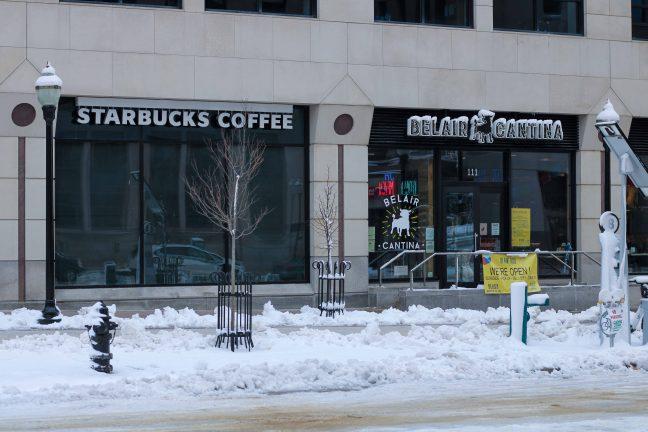Workers at the Capitol Square Starbucks location publicly announced their decision to seek unionization March 29, following a national trend of Starbucks workers pushing for unions.
The Capitol Square location aims to join two other Starbucks stores in Wisconsin who are organizing for unionization, building off unionization efforts that have been pursued by Starbucks workers across the country in recent months. The momentum behind unionization started with Starbucks workers in Buffalo, New York, who voted to unionize in December 2021 and became the chain’s first union in the U.S.
The other Starbucks workers who have voted to unionize joined Workers United, an American and Canadian labor union affiliated with the Service Employees International Union, according to the Workers United website. The union has petitioned for elections at 150 Starbucks stores across 27 states with eight locations successfully unionizing, according to HuffPost.
Starbucks shift supervisor and member of the Capitol Square Organizing Committee Lee Marfyak said the five-person committee aims to negotiate with Starbucks and secure a contract for all employees at the store. Though the committee is currently focusing on forming the union, Marfyak said more specific goals for the future include negotiating for better wages, healthcare options, work conditions and other benefits such as free food and drinks.
University of Wisconsin junior Evan McKenzie has been a barista at Starbucks for five years. The push for unionization was motivated after the company’s failure to prioritize the workers’ needs during the COVID-19 pandemic, McKenzie said.
“We had pretty consistent understaffing, and they gave us a bunch of really cool benefits at first, like better pay and a bunch of additional benefits,” McKenzie said. “At almost the height of the pandemic, they just took them all away.”
According to the research done by Working Wisconsin, the unionization rate in Wisconsin was above the national rate from 1964 to 2011 but fell by 35% between 2011 and 2020 following state policies like Act 10, which reduced the strength of public and private unions.
Despite the statewide decline of unions, McKenzie said Wisconsin has been responsible for historically pioneering strong union tactics — Madison in particular has been generally positive toward unions. While conservative lawmakers have made it much more difficult to unionize, McKenzie said the rest of the workers at Starbucks, as well as others in Wisconsin, have been supportive of the unionization efforts.
Starbucks stores in Plover and Oak Creek, Wisconsin, started seeking union representation and organizing in February. The locations sent letters to the chain’s leadership based out of Seattle, calling on Starbucks to recognize their unions and citing poor working conditions as their reason for unionization.
With the momentum of other organizing Starbucks unions and the potential support from the Madison community, McKenzie expressed hope for “a seat at the table” as a member of the union organizing committee.
“I think that the majority of workers support getting the bread and butter issues on the table through unionizing,” McKenzie said. “I think we’re really excited about … how the city will react to this union.”
Starbucks has stated in previous statements it is against its stores forming unions and encourages stores to vote no to unionization, according to its website “One Starbucks,” which addresses stores’ unionization efforts.
“We don’t believe having a union will meaningfully change or solve the problems you’ve identified in your stores,” the One Starbucks website said. “We know we aren’t perfect, but we believe our challenges are best addressed by working together.”
As the chain’s unionization movement has gained momentum in recent months, Starbucks has been accused of actively retaliating against union workers with the purpose of union-busting. In Tennessee last month, Starbucks fired seven workers who have been working to organize a union, though the company denied the intentions behind the layoffs as being connected to union efforts, The Guardian reported.
Marfyak said there has not been much retaliation compared to other regions. Based on the relatively mild retaliation against Starbucks workers who have voted to unionize in Oak Creek and Plover, Wisconsin, Marfyak said the unionization at Capitol Square will most likely follow a similar path.
“I think we’ve also been very smart on keeping things low-key, so they don’t know exactly what’s coming, and we’re gonna try and take them by surprise,” Marfyak said.


